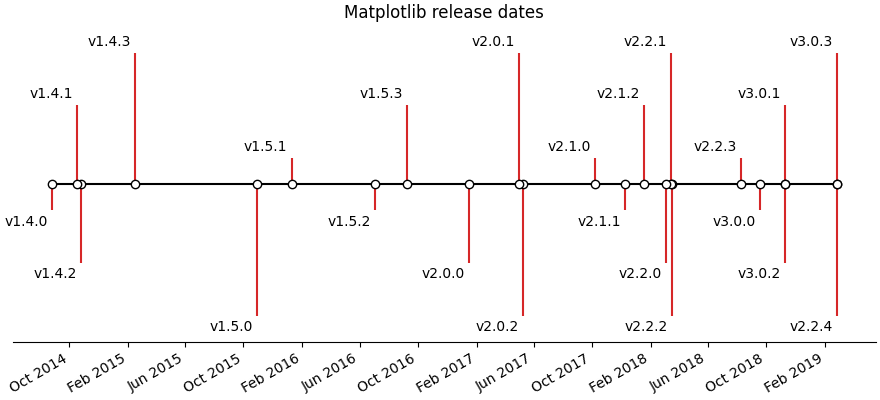ノート
完全なサンプルコードをダウンロードするには、ここをクリックしてください
線、日付、およびテキストでタイムラインを作成する#
Matplotlib のリリース日を使用して簡単なタイムラインを作成する方法。
タイムラインは、日付とテキストのコレクションで作成できます。この例では、Matplotlib の最近のリリースの日付を使用して簡単なタイムラインを作成する方法を示します。まず、GitHub からデータを取得します。
import matplotlib.pyplot as plt
import numpy as np
import matplotlib.dates as mdates
from datetime import datetime
try:
# Try to fetch a list of Matplotlib releases and their dates
# from https://api.github.com/repos/matplotlib/matplotlib/releases
import urllib.request
import json
url = 'https://api.github.com/repos/matplotlib/matplotlib/releases'
url += '?per_page=100'
data = json.loads(urllib.request.urlopen(url, timeout=.4).read().decode())
dates = []
names = []
for item in data:
if 'rc' not in item['tag_name'] and 'b' not in item['tag_name']:
dates.append(item['published_at'].split("T")[0])
names.append(item['tag_name'])
# Convert date strings (e.g. 2014-10-18) to datetime
dates = [datetime.strptime(d, "%Y-%m-%d") for d in dates]
except Exception:
# In case the above fails, e.g. because of missing internet connection
# use the following lists as fallback.
names = ['v2.2.4', 'v3.0.3', 'v3.0.2', 'v3.0.1', 'v3.0.0', 'v2.2.3',
'v2.2.2', 'v2.2.1', 'v2.2.0', 'v2.1.2', 'v2.1.1', 'v2.1.0',
'v2.0.2', 'v2.0.1', 'v2.0.0', 'v1.5.3', 'v1.5.2', 'v1.5.1',
'v1.5.0', 'v1.4.3', 'v1.4.2', 'v1.4.1', 'v1.4.0']
dates = ['2019-02-26', '2019-02-26', '2018-11-10', '2018-11-10',
'2018-09-18', '2018-08-10', '2018-03-17', '2018-03-16',
'2018-03-06', '2018-01-18', '2017-12-10', '2017-10-07',
'2017-05-10', '2017-05-02', '2017-01-17', '2016-09-09',
'2016-07-03', '2016-01-10', '2015-10-29', '2015-02-16',
'2014-10-26', '2014-10-18', '2014-08-26']
# Convert date strings (e.g. 2014-10-18) to datetime
dates = [datetime.strptime(d, "%Y-%m-%d") for d in dates]
次に、近くのイベントも区別できるように、レベルの変動を伴うステム プロットを作成します。タイム ラインの一次元の性質を視覚的に強調するために、ベースラインにマーカーを追加します。
イベントごとに、 を介してテキスト ラベルを追加しますannotate。これは、イベント ラインの先端からポイント単位でオフセットされます。
Matplotlib は日時入力を自動的にプロットすることに注意してください。
# Choose some nice levels
levels = np.tile([-5, 5, -3, 3, -1, 1],
int(np.ceil(len(dates)/6)))[:len(dates)]
# Create figure and plot a stem plot with the date
fig, ax = plt.subplots(figsize=(8.8, 4), constrained_layout=True)
ax.set(title="Matplotlib release dates")
ax.vlines(dates, 0, levels, color="tab:red") # The vertical stems.
ax.plot(dates, np.zeros_like(dates), "-o",
color="k", markerfacecolor="w") # Baseline and markers on it.
# annotate lines
for d, l, r in zip(dates, levels, names):
ax.annotate(r, xy=(d, l),
xytext=(-3, np.sign(l)*3), textcoords="offset points",
horizontalalignment="right",
verticalalignment="bottom" if l > 0 else "top")
# format xaxis with 4 month intervals
ax.xaxis.set_major_locator(mdates.MonthLocator(interval=4))
ax.xaxis.set_major_formatter(mdates.DateFormatter("%b %Y"))
plt.setp(ax.get_xticklabels(), rotation=30, ha="right")
# remove y axis and spines
ax.yaxis.set_visible(False)
ax.spines[["left", "top", "right"]].set_visible(False)
ax.margins(y=0.1)
plt.show()

参考文献
この例では、次の関数、メソッド、クラス、およびモジュールの使用が示されています。
スクリプトの合計実行時間: ( 0 分 1.168 秒)